C.R. Langille's Blog, page 17
January 12, 2015
The Creation of Old Scratch and Owl Hoots
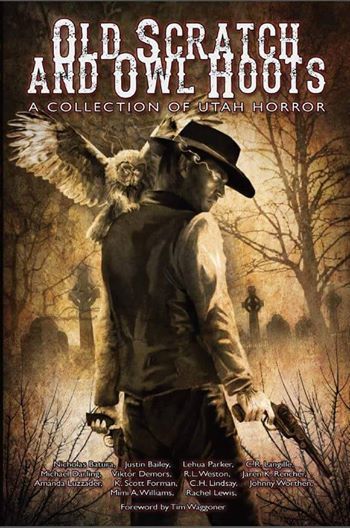 I was recently involved with the creation of an anthology. As a group, the Utah Regional Chapter of the HWA, of which I am the Organizer, decided to create an anthology to help spread some horror. Inside this fine piece of work, are fourteen tales written by authors who have a Utah connection. That means they either live in Utah, have lived in Utah, or have family in Utah. The tales are a collection of Utah horror, many with an Old West vibe. My story, "The Demons We Bring" can be found inside. It's the prequel to "Horishi Tom" so if you are familiar with that tale, you can reacquaint yourself with Jeremiah Redford as he tries to find a way to bring his family back from the dead.
I was recently involved with the creation of an anthology. As a group, the Utah Regional Chapter of the HWA, of which I am the Organizer, decided to create an anthology to help spread some horror. Inside this fine piece of work, are fourteen tales written by authors who have a Utah connection. That means they either live in Utah, have lived in Utah, or have family in Utah. The tales are a collection of Utah horror, many with an Old West vibe. My story, "The Demons We Bring" can be found inside. It's the prequel to "Horishi Tom" so if you are familiar with that tale, you can reacquaint yourself with Jeremiah Redford as he tries to find a way to bring his family back from the dead.After we decided what the theme would be, we put out an open call for submissions. I think we gave the authors a couple of months to get stories back to us. At that time, we didn't quite know who would be the editor/editors. The majority of the Utah HWA submitted stories, as well as a decent number of folks who were outside of the chapter. Once the submission process came to a finish, we reached out to find folks who want to be readers to decide which stories would be kept for the anthology. Due to a lack of volunteers, it ended up being me and two other folks from the chapter. Since I had a story submitted, I didn't vote on my own piece. We went with a simple Yes/No vote. If a story ended up with two no's, then it was out. Basically, that meant if any of the other readers didn't like my story, only one would have to say no then I would have been out (since I wasn't voting on my own piece).
After the stories were selected, we needed editors. Once again, due to a lack of volunteers, it came down to me an another Utah HWA member. Once again, I left my story alone and let the other volunteer do the editing. It was strange being a reader and an editor on a project that had my own story involved, so I did my best to mitigate.
The editing process involved multiple passes between the authors and us. It was a lot more involved than I thought it would be and required a lot of communication between the other editor, as well as with the authors. Luckily, one of our members owned Griffin Publishers, LLC and helped us out with the formatting and publishing of the anthology on Create Space. Another member was good friends with Carter Reid and was able to hook us up with an original piece of art, custom-made for the anthology. Carter, I just want to say that you are an awesome fellow for doing this. Please check him out at his website where he creates a zombie web-comic.
While at times it was a major pain in the ass to get this project finished, I kind of liked it. Maybe I'm a sucker for punishment, but I think I might do another anthology. This time I'll try and tackle it by myself (don't worry, my stories wont find their way into that one).
You can pick up a copy of the book here: http://griffinpublishers.com/publications.html or you can come see us at FanX in Salt Lake City, January 29-31, or Life, the Universe and Everything in Provo, Utah in February and get signed copies at a discounted rate.
Published on January 12, 2015 18:52
December 31, 2014
Old Year, New Year
 It's the end of 2014 and we're about to usher in the new year. I've got nothing exciting planned for New Year's Eve, and am looking forward to relaxing with family. Looking back at 2014, I'm amazed at how fast it went by, and how much happened. Most notably, the birth of my daughter. For those of you who know my wife and me, you'll know how special this little girl is for us. She is surrounded by friends and family who love the snot out of her and I am left in awe at how fast she's growing and learning.
It's the end of 2014 and we're about to usher in the new year. I've got nothing exciting planned for New Year's Eve, and am looking forward to relaxing with family. Looking back at 2014, I'm amazed at how fast it went by, and how much happened. Most notably, the birth of my daughter. For those of you who know my wife and me, you'll know how special this little girl is for us. She is surrounded by friends and family who love the snot out of her and I am left in awe at how fast she's growing and learning.With the new year coming at us fast and hard, there are a few goals I have in mind. I'm a sucker for resolutions, but I like to keep them real. So here we go:
1) I'm currently working on a new book. It's a children's book, so it is kind of a departure from my usual genre. However, it's a fun story and I plan on having it done (at least a rough draft) by March so I can pitch it on Twitter during their Pitch Fever or Pitch Madness or whatever the hell the call it.
2) I finally hit the age where my body has figured out how easy it is to be a lazy ass (in other words, my metabolism took a shit). So I plan on getting back in shape (cliche, I know, but very necessary).
3) I plan on doing more hunting this year (if possible, because it really depends on what tags I draw). I didn't get anything other than one pheasant last year and my freezer is wondering what the hell is up. Need to get on it and harvest some meat.
4) Writing. I need to keep writing. I have a ton of fun ideas and I can't wait to share them all.
I hope 2014 was good for everyone, and I wish a happy 2015 upon all of you.
Published on December 31, 2014 12:34
October 31, 2014
Horror Selfie
The Horror Writers Assosciation is doing a wonderful promotion: Horror Selfies. It's a program designed to promote horror in all forms. You can submit your own selfie, or just peruse the plethora of already submitted selfies. Check mine out here. Have a Happy Halloween!
Published on October 31, 2014 14:40
October 14, 2014
The Waves of Hunting
 I wanted to give an update on my recent hunting adventures. I didn’t draw any tags for deer this year, so I focused all my efforts on elk. I had a cow elk tag for the muzzleloader season, and then an over-the-counter bull tag. The cow tag I drew was for the same region I hunted and killed the bull elk last year. Due to the recent addition to the family, and the fact that I already knew the area, I didn’t go scouting this year. I figured the cow hunt would act as scouting for the bull hunt which would occur two weeks later.
I wanted to give an update on my recent hunting adventures. I didn’t draw any tags for deer this year, so I focused all my efforts on elk. I had a cow elk tag for the muzzleloader season, and then an over-the-counter bull tag. The cow tag I drew was for the same region I hunted and killed the bull elk last year. Due to the recent addition to the family, and the fact that I already knew the area, I didn’t go scouting this year. I figured the cow hunt would act as scouting for the bull hunt which would occur two weeks later.My buddy and I arrived to the camp site early enough this year to get in an evening hunt, so we loaded up and headed straight back to the same spot I harvested the bull last year. We set up, hunkered down, and waited. From each direction we could hear bull elk bugling challenge calls. We even heard the occasional bark from a cow elk nearby. It gave us hope, but alas, nothing came out. We hiked up to the spot where we field dressed the bull from last year and founds pieces of bone, but I thought we would have found a lot more than just little pieces. After a little searching, we found the spine about 30 yards off.
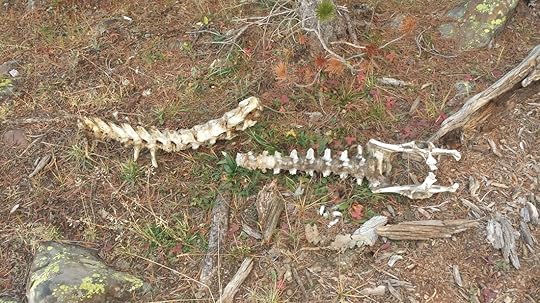 The next morning, we got up early and drove out to the spot again hoping to catch a cow moving through the area. As we turned the corner to the open glade we like to hunt, my headlamps caught a couple cow skirting through the trees. Unfortunately, it was still too dark to shoot, plus they were gone pretty quickly. We didn’t have any more luck that morning, but we made a plan to head back that evening, set up in the trees, and see if the cow would come back. It was a sound plan, and there were a lot of elk sign in the area; however, there were just too many people out there. There were a lot of other hunters roaming around, driving back and forth along the roads on their ATVs. I think the increased activity spooked the elk and they decided to stay put.
The next morning, we got up early and drove out to the spot again hoping to catch a cow moving through the area. As we turned the corner to the open glade we like to hunt, my headlamps caught a couple cow skirting through the trees. Unfortunately, it was still too dark to shoot, plus they were gone pretty quickly. We didn’t have any more luck that morning, but we made a plan to head back that evening, set up in the trees, and see if the cow would come back. It was a sound plan, and there were a lot of elk sign in the area; however, there were just too many people out there. There were a lot of other hunters roaming around, driving back and forth along the roads on their ATVs. I think the increased activity spooked the elk and they decided to stay put.We came back the next morning to see if we could catch them on the move again, but same story, nothing. I decided to hike back to our camp site by following a creek. I thought perhaps I could get lucky and catch a cow having a drink of water. Plus, we had heard more bugling in that direction. It was a good plan, but there were a couple of flaws and warning flags that should have stopped me. The first was the presence of a storm. There were heavy clouds in the distance, and it had already sprinkled a little water on us that morning. The second was the fact that I had never hiked that region before, and didn’t know what to expect. The third was the fact that I didn’t have everything I needed to stay dry in my daypack. The combination of these things should have warned me to try again another time, but I was stubborn and took off anyway. While I was rewarded by some awesome scenery, the error of my choice was about to become apparent.
After an hour and a half of hiking, it started to rain. It was light rain, but it doesn’t take much to get cold. Even more dangerous than the rain, was the thunder and lightning that was danger close. I kept plugging along hoping I would pop out at the camp site, but I had no real clue on how far away it was. I also didn’t know if I could hike the whole way back, if there would be impassable terrain, or what to expect. All rookie mistakes that I knew I was making, but still decided to go forward and hike. Stupid.
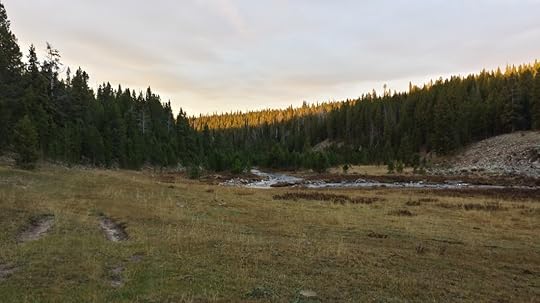 I searched my pack for a poncho once the rain intensified, but found that it wasn’t in my pack. I realized then that it must be in one of my other survival packs, and that I had forgotten to transfer it. My wife had even told me to pack my rain coat before I left, and I forgot to get that as well. I was paying for it then, because the rain started to pour down in droves. I was at a crossroads, and needed to decide quickly whether or not I would make a shelter and wait it out, or keep moving along. There was a bend in the creek up ahead, and I gave it up until that point to see if I could see the camper, or not. Luckily, when I rounded the bend, I saw the camper. I made it back to the camp soaked, but alive. This just goes to show, that if you think something is stupid, maybe you should listen to your instinct.
I searched my pack for a poncho once the rain intensified, but found that it wasn’t in my pack. I realized then that it must be in one of my other survival packs, and that I had forgotten to transfer it. My wife had even told me to pack my rain coat before I left, and I forgot to get that as well. I was paying for it then, because the rain started to pour down in droves. I was at a crossroads, and needed to decide quickly whether or not I would make a shelter and wait it out, or keep moving along. There was a bend in the creek up ahead, and I gave it up until that point to see if I could see the camper, or not. Luckily, when I rounded the bend, I saw the camper. I made it back to the camp soaked, but alive. This just goes to show, that if you think something is stupid, maybe you should listen to your instinct.The rain kept up, and we made a decision to come down off the mountain before the dirt roads got ugly. It was a good choice because it continued to storm all day.
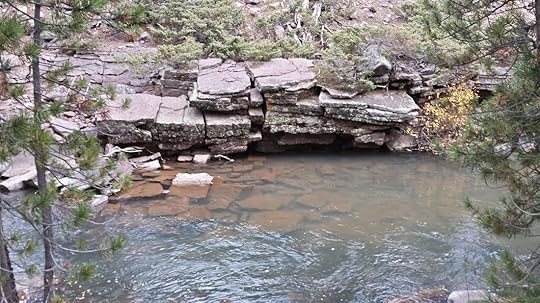 Fast forward to the bull hunt two weeks later. I was optimistic because we had heard the bulls calling all during the cow hunt and I knew they were still up there. Another bonus was the fact that due to state regulations, I could still fill my cow tag during my bull hunt, so it was game on. Just like last time, we arrived early enough to get an evening hunt in, so my brother and I headed back up to the spot. We set up in some cover and started with the cow calls and spraying cow estrus in the air. Nothing came to check us out, so after a while, we got up and moved. As we came out of the trees, I saw a cow elk no more than 20 yards away moving the same direction as we were. I stopped and shouldered my rifle, but by then it had disappeared into the trees.
Fast forward to the bull hunt two weeks later. I was optimistic because we had heard the bulls calling all during the cow hunt and I knew they were still up there. Another bonus was the fact that due to state regulations, I could still fill my cow tag during my bull hunt, so it was game on. Just like last time, we arrived early enough to get an evening hunt in, so my brother and I headed back up to the spot. We set up in some cover and started with the cow calls and spraying cow estrus in the air. Nothing came to check us out, so after a while, we got up and moved. As we came out of the trees, I saw a cow elk no more than 20 yards away moving the same direction as we were. I stopped and shouldered my rifle, but by then it had disappeared into the trees. 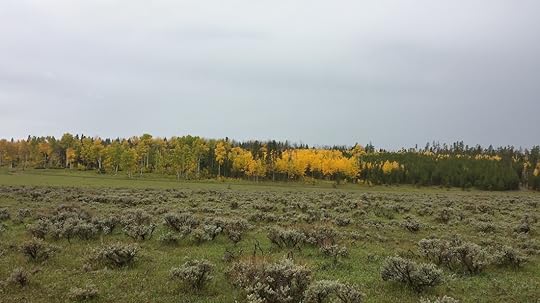 The next morning, we came out to the same spot and hoped to find it again. We heard shots in the distance, so hopefully someone got lucky, but we didn’t see anything. That afternoon, we went for a hike to look for a new area, but didn’t see much sign, so when evening hit, I went to the same area. The place I like to hunt is full of sign, and I’ve seen elk every time I’ve gone up there. It’s an area nestled between two dirt roads, so I think a lot of hunters don’t give it much thought and overlook it. The real trouble started when I got back to camp.
The next morning, we came out to the same spot and hoped to find it again. We heard shots in the distance, so hopefully someone got lucky, but we didn’t see anything. That afternoon, we went for a hike to look for a new area, but didn’t see much sign, so when evening hit, I went to the same area. The place I like to hunt is full of sign, and I’ve seen elk every time I’ve gone up there. It’s an area nestled between two dirt roads, so I think a lot of hunters don’t give it much thought and overlook it. The real trouble started when I got back to camp.Apparently, the batteries in the camper I rented refused to charge on the generator. We ran the generator for hours, and nothing. By the time I got back from hunting that evening, my camping compatriots were scrambling to fix the damn thing. The batteries had run so low that nothing would turn on, and when we tried the generator, the LP gas detector would fault and alarm every 30 seconds with an annoying beep. We checked the breakers, the fuse box, everything we could think of, but no joy. After a trip to town for some tools, trying to charge the batteries with my truck (which worked, but not well enough), and looking into every possible scenario we could think of, we called it quits. While I had packed for warmth, I could tell that my camping compatriots had not and were cold. The thought of sleeping in a camper in the high Uintah Mountains in October wasn’t sitting well with them. So we packed up and came home early.
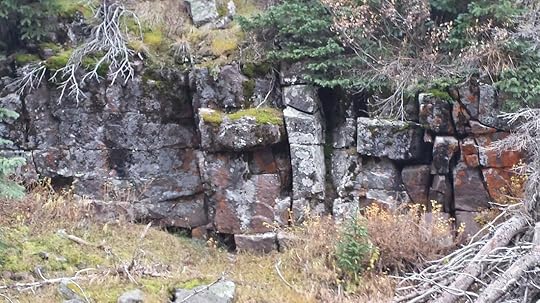 No meat this year. I think it’s the hunting gods balancing things out. Last year I had a successful hunt, so this year was my bad year. Perhaps it goes in waves. The question is how big are the waves? I can only hope and wait for next year. Regardless of actually harvesting meat, it was still a success in the fact that I was able to spend time outdoors in the mountains with friends and family. That kind of success is priceless and always worth it.
No meat this year. I think it’s the hunting gods balancing things out. Last year I had a successful hunt, so this year was my bad year. Perhaps it goes in waves. The question is how big are the waves? I can only hope and wait for next year. Regardless of actually harvesting meat, it was still a success in the fact that I was able to spend time outdoors in the mountains with friends and family. That kind of success is priceless and always worth it. 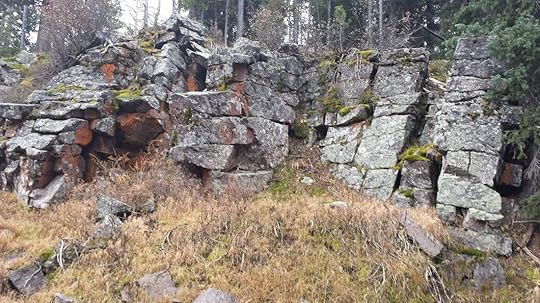
Published on October 14, 2014 19:18
October 7, 2014
Joe Borrelli Speaks on Horror and Role Playing Games
 I asked my good friend and peer, Joe Borrelli to give us his perspective on horror and role playing games. Listen to what he has to say, because he knows what he's talking about.
I asked my good friend and peer, Joe Borrelli to give us his perspective on horror and role playing games. Listen to what he has to say, because he knows what he's talking about.Hi folks. My name is Joe Borrelli and I'm here to talk to you about horror in Role Playing Games.
While RPGs have been solidly ensconced in the fantasy genre since its inception, horror role-playing showcases gaming at its finest. It's the most difficult genre to do; it requires a mix of atmosphere, cooperation, and a willingness to engage in the material. A single disruptive player can ruin the experience for everyone, yet if the game comes together, it can represent the absolute high point of collaborative storytelling experience. Bawdy tales of heroes and battles amuse when shared around a lusty campfire, but tales of terror whispered around dying embers thrill the soul.
I've been running RPGs for almost 20 years, both casually and in convention scenarios. Narrative games have been an important part of my development. They taught me how to tell stories, how to command an audience, how to perform, and how to think on my feet. C.R. Langille, my friend and classmate, asked me a few questions about my experiences running horror RPGs. I'm grateful to have an opportunity to advocate for them.
So, without further ado, the questions.
1) What horror RPG systems have you run, and which is your favorite? Why do you like that system so much?
I want to extend this question to include gaming universes, which are different from systems. I'll forgive an ineffective system if the story is engaging. I'm very fond of the World of Darkness, but the game's mechanics are very cumbersome.
I have run quite a few RPG systems in my time, but the ones I keep circling back to are Call of Cthulhu, World of Darkness, and the Sword & Sorcery edition of Ravenloft.
Call of Cthulhu is, to put it bluntly, the most elegantly designed system created for role-playing games. The system is simple to teach and utilize, while being comprehensive enough to cover practically any situation a PC can encounter.
I'm emphatically not a rules guy. There are people who like the dozens of tweaks and modifiers that more complex systems provide, but I find that systems like that turn games into small unit tactical combat games, with a bit of flavor text to separate the fights. I'm a storytelling guy. I like narrative, interaction, characters, mysteries, discoveries, imagination, and immersion. The less the rules interfere, the happier I am.
Call of Cthulhu lives up to my standards. Mythos games are intrinsically investigative; they're mysteries with a monster behind the parlor door. Some structure is required, and Cthulhu creates that structure without being invasive.
The other perk of the system is permanent vulnerability. Your character can become stronger, smarter, and more dangerous, but a sentry getting off a lucky shot can still take you out. Unlike other systems, which usually end up with the players becoming omnipotent superheroes, combat is always dangerous. Because of this, the game rewards smart thinking; you can't simply waddle in as a meat shield, soak up attacks, and mega-blast your opponents into red mist. Most of the things you face in Cthulhu can wipe you out without much effort, so the system preserves the vulnerability required for effective horror storytelling.
As the title suggests, Call of Cthulhu takes place in the null-cosmology of famed horror writer H.P. Lovecraft. You play as investigators who have unfortunately discovered the true nature of the universe and fight an ineffective battle to keep the darkness at bay a little longer. The pop nihilism of the game is an intriguing antithesis of most RPGs, which work as power fantasies, and make the tiny victories your players win hold that much more meaning. In addition, I'm certain that the Cthulhu RPG has been the most effective at introducing new readers to Lovecraft's work since August Derleth.
*****
After Call of Cthulhu, my favorite horror games are the combined World of Darkness in general and Vampire: the Masquerade in particular.
My first attempt to get into RPGs were met with dismal failure. I was given an Advanced Dungeons and Dragons starter set as a child and couldn't make heads or tails of it. I'm not a fantasy fan and trying to learn the game on my own was horrible. It was like trying to read a math textbook for fun. I made up my own game, played it for a while, looted the box for nifty figures, and stuffed it in a closet.
Fast forward to me at fifteen. I'd gone from metal to punk to goth, and some of my friends were talking about a game where you went to public parks and pretended to be vampires. Friggin' vampires, man!
My allowance came from weekend shifts working at my Dad's pawn shop. A day's worth of sweeping floors and talking to junkies got me the money for the LARP rules. I picked them up, bypassed the rules section, and read the game's mythology section.
The hook of the game is that vampires existed in the world, but they kept themselves secret to keep safe from an unsuspecting humanity. They loved, they lusted, they mourned, they made war. And the different vampire bloodlines fit every type of vampire I'd ever seen in movies or read in books, from brutes to rulers to moody artists.
What worked so well with Vampire was how effectively it built off of all the vampire canon that came before it. You went to the game already knowing something about the world from your exposure to horror media, which made the game universe easy to connect to.
I've run Vampire for decades now and I can authoritatively say that the system has a lot of problems. There's a very narrow chance that your character can fail at anything they attempt to do, but there are too many gradients of success. Combat is cumbersome, often requiring multiple rolls with handfuls of dice. Characters can quickly become overpowered as they start stacking up abilities. Finally, the core mechanic for making your character more powerful requires committing the most heinous crime in vampire society.
All White Wolf games have a massive disconnect between the ideal game they want you to run and the way people actually play it. The game titles itself as "A Storytelling Game of Personal Horror", but to create the pathos required to run the game the way the system wants you to play it would require tremendous one-on-one time between each player and the GM.
There's also the sturm und drang angsty Grand Guignol melancholy that often comes off as laughable. The writers of Vampire: the Masquerade are often guilty of trying too hard to hit the pathos button. My favorite example comes from one of the core rule books; the party is on the tail of a recently-turned Catholic priest. They find him in his cathedral over the bodies of some drained altar boys (I know, I know, shut up.) He begs the players to kill him, but that would be wroooong. Oh that poor priest! What would you do?
So that kind of corny shit seems more laughable the farther away I get from it, and I can only imagine the sad boys and sad girls that wrote the material in the first place, but there's no question that they captured the zeitgeist of the 90s goth aesthetic in the game. The world is compelling, the stories stick with you, and I can still meet up with veteran White Wolf players and discuss the World of Darkness for hours on end.
My style of running Vampire: the Masquerade was to treat it like a supernatural mafia story. Vampire life is fundamentally illegal, there are great consequences for discovery, and the factions are all vying for power. It's fertile ground for stories about subterfuge, manipulation, power dynamics, and predatory instinct.
*****
As I mentioned earlier, I'm not much of a fantasy fan. I lack the imagination.
Science fiction and fantasy are as much about the setting as they are about the story. You have to know the rules, the lingo, the factions, and all the other minutia required to get into the narrative. Horror is often set in our world, with intrusions. I can understand it, I don't have to memorize tons of tedious world-building information.
One of the only fantasy settings that ever pulled me in was Ravenloft, one of the campaign settings for Dungeons and Dragons. In particular, the setting as written by Sword & Sorcery, White Wolf's fantasy line.
The gist of Ravenloft is that it's a horror-tinged fantasy setting, set in an aesthetic that recalls classic Universal and Hammer gothic horror films. A mysterious force known as the Dark Powers, usually represented as a relentless, implacable fog, has created a hellscape of interlocking fiefdoms. The rulers of each fiefdom is under some unresolvable curse, based off the sins in their lives. For example, the Dracula-like vampire Strahd Von Zarovich was cursed for the crime of killing his brother in order to seduce his brother's bride. The bride threw herself off the castle parapets and Strahd was cursed with immortality. Once a generation the bride is reborn somewhere in the kingdom and Strahd tries to possess her, only to have her taken from him.
Ravenloft subverted a lot of the things that drove me nuts about Dungeons and Dragons. Gods are coldly distant, spells that impart knowledge are ineffective, and moral questions can no longer be determined by alignment spells. More than any other setting in D&D, your characters are fully in charge of their own fate.
It's also an intensely personal game. Every major villain has been doomed by their own actions, and it's very easy for the players to condemn themselves. White Wolf's creative team seemed to have stripped away the bathos of their more melodramatic worlds and created a game where characters are fully empowered to damn themselves. Even if you and your players don't want to play an intricate story about a fall from grace, stomping through graveyards and staking vampires is always good for a laugh.
I'm currently running a werewolf campaign in the wolf-haunted land of Kartakass. The players have taken refuge in a small town with odd rituals of hospitality, the wolves are creeping the streets at night, and a great culling has drawn the hunters into the fog-shrouded wolves. I get to bust out my creaky Eastern European accent, describe strange rituals, and game with the lights off. It makes up for the times that the clunky rules interrupt, the battle map comes out, and everyone has to roll for initiative.
2) It can be difficult to get players in the right frame of mind for playing a horror RPG, how do you set the tone/mood?
First off, most of the things gamers think of as horror isn't actually horror.
Having a monster in a game doesn't actually mean that the game is horror. Buffy the Vampire Slayer had all kinds of traditional horror monsters, but was almost never actually scary. It was an action show, with vampires taking the place of gangsters, ninjas, or whatever other goons action stars typically beat up. Horror is primarily about mood, not violence.
To that end, the most important rule to running horror RPGs is don't run games for players who don't care for atmospheric gaming.
Most gamers are socialized in playful gaming. There's lots of shit talking, clowning around, Monty Python references, and musical interludes. While that's fine in casual games, any of these things can instantly shut down the ambiance required for horror gaming to work.
Pretend you're around a campfire, telling a story about a maniac that stalked the woods in the years prior to your visit. The fire is dimming, your voice drops to a low menacing growl, and your audience leans forward, getting into it. Suddenly, one guy's cell phone rings some ridiculous ringtone. Everyone laughs, they tease each other, and the spell is broken. You've lost them, and you have to work twice as hard to get them back.
Now imagine you're in a place with a lot more distractions, with an audience acclimated to interrupting each other. And there's always one player who just can't help themselves.
So, lesson one, some people should be excluded from your group.
You don't have to be tyrannical about it. Sit down with your group, explain to them that you're trying to create an atmosphere of horror, and it requires them to participate in it by not undermining the mood. That means minimal jokes and crosstalk, with an eye toward preserving the experience for everyone else. Doing this lays out the expectations for the game, and I've found that players rise to those expectations accordingly.
Once you've earned their trust and support, you've got to abide by rule number two: you cannot be a shitty GM.
That means you have to know the material, you have to be evocative without being ponderous, you can't steamroll the players with your plot, and you have to speak with confidence and authority. Horror GMing, more than any other type of gaming, is all about the cult of personality. You are the storyteller. Win them over and keep them on your side.
This is where the performative aspect of game mastering kicks in. You have to be an actor. In general, I go broad with the NPC performances (Ravenloft is particularly good at this, where every NPC is either "peasant" or "peasant who's up to something") and I go very quiet doing descriptions of scary scenes. Voice modulation is key: scenes of violence get described with a slowly growing hysteria, ominous or supernatural sections get described very slowly in a distant voice, and I seldom directly engage with any player unless they ask for my attention. The goal is to present my descriptions in a way where the tone of my voice does half the work for me.
As far as game construction goes, you have to use a lighter touch for horror gaming. Intensely graphic descriptions of violence comes off as more farcical than scary. A zillion severed heads turns your game into a heavy metal album cover. The gentle creaking of a hanged man's rope, heard through the echoes of an abandoned house, is infinitely more effective. The game should be less focused on combat and more focused on mystery. Mystery and horror are siblings, and combat has a tendency to steamroll over atmosphere with game mechanics. Finally, all your scenes should be short in duration, so that nothing has a chance to go stale. A permanent sense of dread and disquiet should be a part of every scene, so your big payoff scenes have more impact.
Rule number three is, of course, atmosphere.
You can't do horror gaming in the day. You can't do horror gaming in well-lit place. You can't do horror gaming in a place where non-players traipse through and constantly interrupt.
I'm lucky. I play my Ravenloft campaign in my former office. It's big and empty, with quiet conference rooms. There's a dim light we drag over to the table, and the players carry tiny utility flashlights in case they need to look at their character sheets.
The other perk is the pitch-black meeting rooms. I like pulling individual players inside, turning off all the lights, and imparting particularly creepy information to them in the dark. This technique works better on some players than others, but the ones that get really creeped out brings that unease back to the table. Never allow these interlude to last more than a minute, though. Part of keeping their attention is never allowing your players to lay idle for too long. The old rule about boredom being a GM's primary opponent is especially true in horror gaming.
One of my favorite tricks as a GM is that I wear a bone-white mask that I picked up from NYC's Sleep No More show when I'm running the most tense scenes. The white mask stands in contrast to the darkness of the room, and it dehumanizes me enough to give my words a little extra oomph.
Finally, ambient sound helps. I'm a big fan of the website Tabletop Audio, where a Hollywood sound engineer created tons of background music. Some of his tunes, especially "Catacombs", have an eerie Eraserhead vibe to them. For bigger setpieces, the first few songs to the Bram Stoker's Dracula score work equally well.
3) Do you have any personal experiences that you'd like to share from running a horror themed RPG?
Most of my style and technique works for me, so I can't say I have a lot of stand-out memories. The most rewarding thing for me is when my players totally immerse themselves in the story and engage with it on their own terms. Setting the mood takes a lot of effort, but my players speak highly of the game afterward.
My most effective scene is from one of my Call of Cthulhu convention game. The players are investigating an artist who drowned his daughter in the bathtub and hung himself after nightmarish visions of Cthulhu drove him to madness. Visions of the daughter's death haunt the players and eventually they find themselves at his house.
After finding the bathtub where the drowning happens and witnessing thrashing water and sounds of violence, I usually slam a book on the table to simulate the bathroom slamming shut in their face. Once the players recover from the jump scare, I tell them that they hear the sound of a creaking rope coming from the bedroom at the rear of the house. The bathroom scare has them on edge and they know what's waiting for them, so they often proceed cautiously.
By the time they see the ghost, I carefully describe the horror of the scene. Before he disappears, the players hear "I still dream."
The idea that death has given the man no escape sends a chill down my player's spine. It's the bit I've been complimented about the most.
4) What are some tricks or tips for people who may be running their first horror RPG?
I feel like I answered the question at length in the other section, but I've just described the stuff that works for me.
My tricks are my own, and I feel like they're very effective for my style. Ultimately they're a static solution to a dynamic problem. You have to develop your own techniques that fit your own play group.
Ultimately, you're trying to create the performative version of a Haunt. The golden rule is atmosphere, atmosphere, atmosphere. You want to use whatever trick in the book to isolate the players, make them feel vulnerable, and make them wary to open the next door.
Dungeons are the most effective setting for fear, but they're seldom used that way. It's scary to crawl into some forgotten crypt full of monsters and curses. The only thing missing is the atmosphere. Mine every scene for horror, keep the tension high, and find your own way to freak out your players.
As I was reviewing this questionnaire, I realized that I was missing the most important part of horror GMing, the one aspect that will kill your game if it's not fulfilled:
Commitment.
You have to commit fully to scaring the crap out of your players. They are playing to be afraid. If you break that tension, crack a joke, or defuse the scene in any way, you're betraying that trust.
I remember an interview Anna Faris once gave where she said the best advice that Keenan Ivory Wayans ever gave her was that there is no vanity in comedy. You have to commit fully, even if it means being broad and buffoonish. I believe that horror is often the inversion of comedy, which is why the two work so well together. The more you commit to the performance, the more you will impress your players.
Epilogue
Well, I think I've laid out everything I know about running horror RPGs. I hope this has been helpful to people. I've certainly enjoyed writing it, especially in light of my current Ravenloft campaign.
I've covered a lot of this stuff in my blog ( creaturecast.blogspot.com ), specifically in my How To Run A Horror RPG post ( http://creaturecast.blogspot.com/2013/04/how-to-run-horror-role-playing-scenario.html ). In addition, I discuss gaming topics at length on my podcast ( creaturecast.net ), including White Wolf games ( http://www.creaturecast.net/white-wolf-role-playing-games / ) Vampire: the Masquerade ( http://www.creaturecast.net/vampire-the-masquerade/ ) and the works of H.P. Lovecraft ( http://www.creaturecast.net/h-p-lovecraft-and-the-cthulhu-mythos/ ).
Thanks to C.R. for this opportunity. Read his stuff, it's awesome.
Enjoy your games, everyone.
Published on October 07, 2014 18:56
October 4, 2014
Don't Open the Door!
I wrote a guest blog post for the Utah Horror Writers. It's delves into fear of the unknown and why characters are tempted to investigate the strange noise in the basement. Go check it out! http://utahhorror.blogspot.com/2014/10/curiosity-kills-and-fear-of-unknown.html
Published on October 04, 2014 16:17
September 24, 2014
"Mr. Abernathy's Music Box"
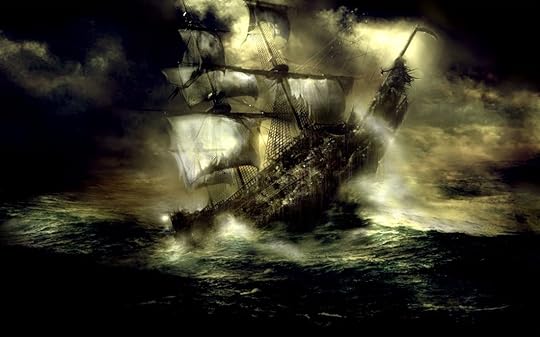 Here is the short story I promised for reaching 100 likes on my Facebook page. I hope you enjoy the story as much as I enjoyed writing it.
Here is the short story I promised for reaching 100 likes on my Facebook page. I hope you enjoy the story as much as I enjoyed writing it.“Mr. Abernathy’s Music Box”
I looked at the passenger manifest, twice. Being a sea-faring man, I had my share of superstition. While this didn’t meet any known superstitions I could think of, the fact that Mr. Abernathy was listed as a passenger left a sick feeling in my stomach. That was enough to salt my drinking water.
To call Mr. Alistair Abernathy strange, would be like calling President Lincoln tall—it was just fact. Everyone knew it, and everyone accepted his strangeness with a subconscious apathy. We ignored his odd mumbling, the way he shambled about town hunched over and constantly searching about, we even ignored his yearly tour around the town when he’d knock at each and every door asking the whereabouts of his wife. She died over ten years ago when his boat sunk near Sorrow Reef. A fisherman found him on the beach the next morning, and said Mr. Abernathy just stood there and stared out to sea, pieces of his boat washed up all about him. Story goes, Mr. Abernathy had nothing on his person but that music box he carries around tucked in his coat pocket. The authorities searched for his wife, but couldn’t find her. Bad business all around.
You can imagine my curiosity when I found Mr. Abernathy listed on the manifest. To my knowledge, the man hadn’t left the Bay since he and his wife arrived from the Utah territories. Wasn’t due to monetary concerns; supposedly he owned a mining outfit in Utah by the name of Angus. We assumed he stuck around after the accident because he waited for his wife. Yet, lest my eyes deceived me, his name sat atop of my manifest—Longboat Bay to London, England.
“Captain Bonnie, have you gotten a look at the manifest?” I asked.
The Captain was a giant of a man. He always ducked when going through doors, and nobody ever looked down at him. With a large belly threatening every button on his shirt, and an ashen grey beard, Captain Bonnie was a formidable presence.
“That I have Mr. Grimes that I have. Is there something wrong?” he said.
“Everything’s in order sir, with the exception of one passenger. Mr. Alistair Abernathy is booked to London, sir.”
The Captain raised an eyebrow and stroked his beard. Crumbs of bread fell to the wooden deck of the ship.
“And the problem is what, Mr. Grimes?”
I found myself having trouble trying to formulate a proper response to his question. What was the problem?
“Do you think it wise to let someone in his state on board, sir?”
“And what state would that be?”
“His mental state, sir.”
The Captain let out a sigh that could have filled the mainsail. He took the passenger manifest from me, folded it up and stuffed it in my coat pocket.
“Mr. Grimes, the poor Mr. Abernathy paid in full for this voyage. He paid extra, in fact. Enough to convince me to alter our course slightly.”
I opened my mouth to protest but the Captain held a finger up and stopped me before I could utter a word.
“The alteration won’t delay us any, Mr. Grimes. Now I suggest you let him be, and get back to ensuring we are ready to go. Do I make myself clear?”
The steely glint in the Captain’s eye was enough to tell me to drop the matter. He wouldn’t budge and it wouldn’t do to argue further in front of the crew. It was bad enough that we’d have to make the voyage with Mr. Abernathy.
“Clear as mermaid’s tears, sir.”
“Good. Now make ready. The winds are in our favor.”
As we made preparations to depart, the passengers boarded. We didn’t have many this time, and I could understand the Captain’s willingness to allow anyone aboard if they had the money to pay. Yet, as Mr. Abernathy stepped onto the deck, Death used my spine as concertina. Mr. Abernathy slunk on board, looking all about as a criminal would. He’d bring nothing but bad luck on the voyage. I would have to keep a watchful eye on him.
Mr. Abernathy slipped beneath deck to his quarters and remained unseen for the rest of the day. We pushed off from the bay and made our way to open water. It was good to be out at sea again. The rise and fall with the waves, the salty spray in the air, it was heaven.
“Have you seen her, my wife?”
I spun around to find Mr. Abernathy behind me. He clutched the wooden music box in his hands, his knuckles white with exertion.
“Mr. Abernathy, your wife is dead. You know this. Please stay out of the crew’s way. The deck is very dangerous.”
I tried my best to keep my wits about me, but being so close to the man put me on edge. My hands shook and I couldn’t help but stare into Mr. Abernathy’s dead eyes. I would be happy when we pulled into London and offloaded him. We’d all be better off.
“Not dead, sir. Just waiting.”
He fiddled with the music box and twisted the crank. The old gears whizzed and sputtered, but no music came out. Yet that fact didn’t stop Mr. Abernathy from swaying to and fro to a tune which apparently only he could hear.
“Waiting for what?” I asked.
He stopped swaying to the imagined tune and stared me direct in the eyes.
“Waiting for me.”
With that, he scurried off below deck with the music box to his ear. The winds picked up and licked at the sails. The sun dipped low beyond the horizon and cast the sky in a sanguineous glow. Following the luck with Mr. Abernathy, the red sky didn’t bode well. We were in for a bumpy ride.
My prediction blossomed to life at twilight. Dark clouds rolled over us and brought with them all the moaning and groaning Poseidon could muster. The waves tried to drag us under, but the Scarlet Whale was a stubborn bitch. It’d take more than a squall to send us to the deep.
The heavy footfalls of the captain vibrated behind me. The big man looked to the storm, then to me.
“Mr. Grimes, make sure all the passengers are safely secured down below. We wouldn’t want anyone taking a midnight swim.”
“Sir!”
I accounted for everyone, with the exception of one passenger—Mr. Abernathy. Thunder boomed above deck and the sea decided it was a good moment to throw the ship. I had good sea legs, but still fell. My head hit the wall and for a moment, I couldn’t see straight. The rush of waves and the creak of the ship sang to me, but something else floated to my ears, a melody of some sorts. The sound came as fast as it went, but I couldn’t shake the song from my head.
Lightning cut across the dark skies and left a squall of light floating in my vision. The same music crawled into my ears again, and just as I thought I recognized the tune, thunder bellowed and drowned the notes away. I grabbed the railing and heaved up to my feet.
The Scarlet Whale rode the waves as if they were made of broken glass—beautiful and sharp, yet deadly if handled wrong. Captain Bonnie had more experience on the sea than most people I had ever met; therefore, I wasn’t worried about the ship. I was, however, worried about the safety and wellbeing of the people on board the ship, even Mr. Abernathy. Whether I cared for the man or not didn’t matter, I was in charge of his safety, and I intended to keep him safe.
I found Mr. Abernathy at the bow. He stood at the very edge of the deck, and if it weren’t for the railing, I had the feeling he would have walked right into the dark waters below. A tall fellow by the name of Jacobo stared at Mr. Abernathy. Jacobo had a thick island accent which many couldn’t understand, but he did his work and could lift more than anyone else I had ever seen. He simply stood and wrung a red cap in his large hands, over and over again.
I walked behind him and placed a hand on his shoulder. Jacobo started at my touch and whirled around to face me. His eyes were wide and the whites were clearly visible which created a strange contrast the man’s mahogany skin.
“Go check on the cargo, if you would. It would be our end should it come unsecured during this swell,” I said.
Jacobo didn’t say anything, just nodded. He made his way below deck, but not before casting another glace toward Mr. Abernathy. I motioned him below deck. He nodded and disappeared.
The sea shook us and caused the ship to list to the side. I grabbed onto the rail again to keep from falling overboard. Somehow, Mr. Abernathy stayed onboard during all this. The man clutched the music box tight to his body and stood motionless. He was on the lookout for something.
“Mr. Abernathy! We must get below deck!”
If he heard me, he didn’t show it. I inched closer to the man. The waves came at us harder and faster, which made any movement difficult. The ship swam with the sea, but walking was almost impossible; up and down, side to side. Even Captain Bonnie would have a hard time moving through this.
“Mr. Abernathy! Please, I implore you we mu-”
Music cut me off. It came clear, as if I sat center theater next to an orchestra. A soft melody that rode the wind as we rode the waves. The music seemed to overpower the thunder and the storm’s bluster. Soon, the only noise in my head was the sound of my own breathing, and the music.
Mr. Abernathy lifted the music box over his head. He closed his eyes and smiled. The Scarlet Whale listed with a violence that took me off my feet. I slammed on the deck and for a moment, only a high-pitched ringing filled my ears. Then the damnable music washed up in my consciousness again.
Salt water came aboard once more and slammed me against the smooth wood. This time, instead of knocking the sense from me, it gave me focus and pulled me back to reality.
Mr. Abernathy’s cackle of joy cracked into the night air. I struggled to get my feet under me while the ship fought the sea. Finally, I stood.
Mr. Abernathy dropped the music box at his feet. The man stared out into the inky darkness.
“We need to get below deck!” I said.
He didn’t say anything, but continued to search. Perhaps if I could get the music box the man would listen. It would be a last attempt before I left him to Poseidon’s will.
I used the rail to get close. Even with its support, movement was very difficult. The ship tried several times to throw me into the drink. A sense of duty kept me moving even though I wanted to turn around and head to the safety of the hold. Let the Sea take Mr. Abernathy and his lunacy. I almost turned around right then, but I was so close. The wooden box was nearly within arm’s reach. With one hand clamped onto the rail, I extended my other arm out. The tips of my fingers brushed across the intricate carvings of the music box, then the ship lurched and the box rolled away.
I cursed and crawled toward the box. I knew if I tried to walk, I’d only risk more injury. The box sat on its side, with the lid open. The music still played in my head, but not from the contraption only an arm’s length away. It came from the sky. It played from the sea. The waves and wind worked in concert to produce a haunting melody which saturated the very core of my being. I knew if I survived this storm, I would never hear another song so lovely and haunting. The box was just within reach. I stretched out to grab it, confident it would help lure Mr. Abernathy below deck.
Mr. Abernathy grabbed my arm, his hand clamped down on my wrist like a crab-claw. A smile was perched upon his face, but his eyes were distant.
“My wife, Mr. Grimes. I know you’ll like her. She’s such a lovely lady and always enjoyed company.”
I tried to wrest my arm away, but something caught my eye. It was just a glimpse of shadow in the darkness, silhouetted in a flash of lightning. A crag of sharp rock loomed in front of the ship and stretched high into the air told me where we were—Sorrow Reef.
Mr. Abernathy sunk to his knees and whispered into my ear.
“We’re home.”
I closed my eyes as the ship careened into the reef.
***
The sun beat overhead. A gull cried out nearby. Water caressed my feet. These were some of the first sensations that came to me as I lay on the sandy shore. A dream perhaps? Yet I knew better. The aches and pains in my body from crevices and corners that I never thought of told me differently.
I rolled to my side and opened my eyes. The bright light stole my vision and made it impossible to see any details. I rolled to my back and just focused on breathing. The simple act of survival came with some difficulty, and that’s when the real pain started. My side burned, a fire that grew with each ragged breath. I reached down and my hand ran across a jagged shard of wood lodged between two ribs.
My vision adjusted to the light. A piece of the Scarlet Whale’s railing jutted from my abdomen. Blood trickled from the wound and soaked into the brine covered sand. The waves licked the wound causing further discomfort and pulled red ribbons of blood back into the sea.
I rested my head on the ground and watched the sky for awhile. The thought of moving further inland sat patiently in the back of my mind. Finally, I took a deep breath which elicited a grunt of pain, and sat up. Debris from the shipwreck littered the beach all about me. Bodies of my shipmates were scattered about like ragdolls. I tried to call out to them, but it came out a whisper dragged across a rasp.
Something washed up with the next wave and brushed against my hand—the music box. It looked none the worse for wear. I picked it up and moved to open it, but hesitated. If the music played, I wasn’t too sure if I my mind could handle it. Yet curiosity got the better of me and flipped the lid open. Nothing but silence greeted.
I let out a breath I didn’t know I was holding and threw the box away. With great effort I got to my feet and shambled down the beach. Storm clouds gathered in the distance, a promise of more foul weather to come.
A soft melody drifted into the air and stopped me dead in my tracks. It became louder and louder until I had to cover my ears. I dropped to my knees and curled into a ball, aware of the pain in my side but uncaring. Laughter boiled up from my guts and spilled out into the salt-brushed air.
“We’re home.”
Published on September 24, 2014 16:29
September 7, 2014
Salt Lake Comic Con
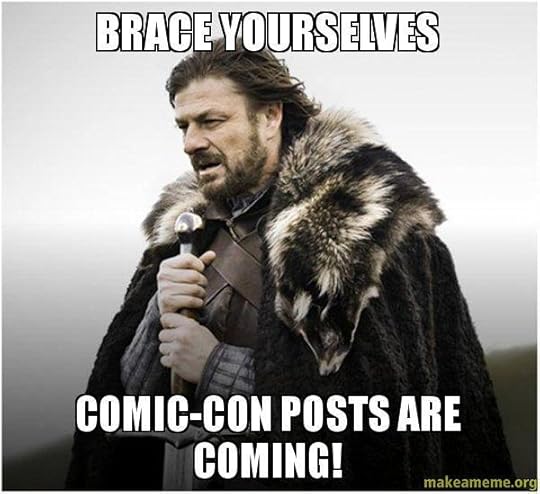 Yesterday ended the three day extravaganza that is Salt Lake Comic Con. Like last year, I attended all three days. However, unlike last year, this time I sat a booth for the majority of the time. That's right! I sat a booth. Earlier this year, I organized and created the Utah Horror Writers, which is the Utah Chapter of the Horror Writers Association. We were lucky enough to jump in on the World Horror Convention's table and help promote that event, as well as our upcoming anthology. We had a raffle, WHC memberships, and a bunch of other stuff to sell to help raise money.
Yesterday ended the three day extravaganza that is Salt Lake Comic Con. Like last year, I attended all three days. However, unlike last year, this time I sat a booth for the majority of the time. That's right! I sat a booth. Earlier this year, I organized and created the Utah Horror Writers, which is the Utah Chapter of the Horror Writers Association. We were lucky enough to jump in on the World Horror Convention's table and help promote that event, as well as our upcoming anthology. We had a raffle, WHC memberships, and a bunch of other stuff to sell to help raise money.While I always had an idea what it would be like to sit a booth at a con, I never had the actual experience. While this wasn't just me sitting at a table chock full of my own books to sell, nevertheless, it gave me a taste of what's to come. I'm now both excited and terrified.
The first thing I learned, came from an early memory of Roadhouse. Be nice.
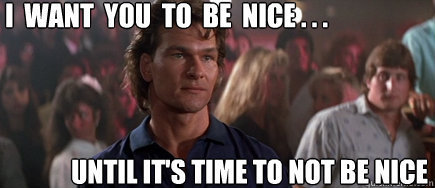 That's right, be nice. There were so many times I had to paint a smile on my face and be nice. Times when I'd rather tell someone to shut the hell up, or go away. But, I had to be nice. Now don't get me wrong, it was awesome to sit out there and meet tons of people who were fans of horror. It was great to have the experience of working a convention. It was great to have somewhere to come back and chill after walking the convention floor. But let me tell you something, it's exhausting. Halfway through the last day, I just wanted to go curl up and take a nap somewhere.
That's right, be nice. There were so many times I had to paint a smile on my face and be nice. Times when I'd rather tell someone to shut the hell up, or go away. But, I had to be nice. Now don't get me wrong, it was awesome to sit out there and meet tons of people who were fans of horror. It was great to have the experience of working a convention. It was great to have somewhere to come back and chill after walking the convention floor. But let me tell you something, it's exhausting. Halfway through the last day, I just wanted to go curl up and take a nap somewhere.The next thing I learned, was body language.
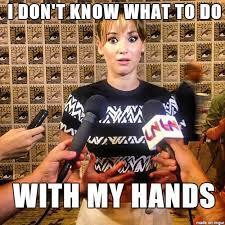 I naturally sit or stand with my arms crossed. However, I realize that comes off a little stand-offish. I wanted to be inviting to people (hence the be nice post), so it was constant battle trying to figure out what to do with my hands. Always smile. Look people in the eye (even if it freaks them out). Listen to what they have to say (even if it's stupid). Be nice.
I naturally sit or stand with my arms crossed. However, I realize that comes off a little stand-offish. I wanted to be inviting to people (hence the be nice post), so it was constant battle trying to figure out what to do with my hands. Always smile. Look people in the eye (even if it freaks them out). Listen to what they have to say (even if it's stupid). Be nice.All in all, it was a great experience, and gave me some lessons learned for sitting a table. Mainly, advertising, organization, and a helpful crew of people who are all on the same page. I can't wait until the next convention to apply these ideas. And I can't wait until I have my own booth with some shiny new books written by C.R. Langille.
Be nice.
Published on September 07, 2014 10:05
August 29, 2014
Fishing for Audience
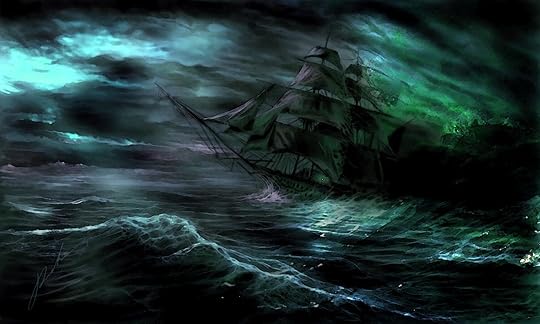 I currently have 81 likes on my author Facebook page. Last time I went fishing for likes, I offered a piece of flash fiction if we hit the goal. This time, if we can make it to 100 likes, I'll post a short story for your enjoyment. The picture above tells a little bit about the story's subject matter. So please, go to my Facebook page and hit like, send your friends as well! It's the best way of keeping up with what's going on in my dark mind.
I currently have 81 likes on my author Facebook page. Last time I went fishing for likes, I offered a piece of flash fiction if we hit the goal. This time, if we can make it to 100 likes, I'll post a short story for your enjoyment. The picture above tells a little bit about the story's subject matter. So please, go to my Facebook page and hit like, send your friends as well! It's the best way of keeping up with what's going on in my dark mind.
Published on August 29, 2014 11:49
August 22, 2014
Trying Something New
I decided to take a different approach for one of my short stories. I came across a website, FictionArcade, which is basically an author uploaded site for short fiction. They allow authors to upload their own work for people to enjoy. It takes tokens to read stories, and each token costs .25 cents. Authors can charge up to three tokens per story, and they'll get .20 cents of that token paid directly to them. They run contests each month, and the winner of each contest (i.e. owner of most paid tokens) gets 250.00. I decided to give it a whirl and see what happens. So I uploaded my short story, "Mr. Abernathy's Music Box" which is a supernatural horror about a man with a broken music box searching for his drowned wife. If you would like to read it, please go here, and you can find it for a measly .20 cents. Worst case, I don't get anything, then I take the story down and call it a learning experience. Best case, people love the story and word of mouth drives some sales and recognition. Only time will tell.
Published on August 22, 2014 21:40



